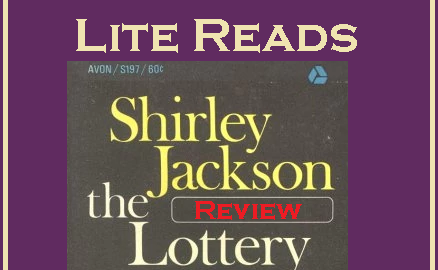Lite Reads week seven comes to a close, as we finish with our short story selection The Lottery by Shirley Jackson, chosen for Banned Books Week. Throughout the week there have been questions as food for thought on social media as people had the chance to read it and think about it. Before I announce the next Lite Reads selection (September 30), I will be sharing my own thoughts right here. Spoilers ahead for those who haven’t had the chance to read it.
The Lottery by Shirley Jackson was published in 1948 in The New Yorker. Jackson received hate mail for the story, and The New Yorker received hate mail and had subscriptions cancelled. The story has been challenged anywhere from individual schools to entire countries (South Africa). The story focuses on a town in a world where individual communities host lotteries to determine which person in the community will be stoned to death by the rest of the population. Many have claimed that the repeated challenges and bans were because of the violent twist at the end of the story, but these bans have also likely happened due to the political connotations the story holds.
The town seems like a real North American town, with the characters feeling like real small town inhabitants. Each person is written in a way that gives the appearance of being a person you’ve always known in your town, without really knowing anyone that well. It reminded me of many of the people in the small town I grew up in myself. Everyone is familiar and friendly, not all of that friendliness is genuine, and outside of your own close family and friends, what you know about everyone else tends to be gossip.
The writing style and structure is cleverly pieced together and played out. The foreshadowing of what’s to come is subtle (children piling rocks). Despite an early summer setting in a small town, the tone of the whole story is slightly off. Something feels sinister about the whole thing before you even know why it feels sinister. The build-up is so well done that you could guess the ending, but if you’ve never had any spoilers about the story it is unlikely that you would guess. It is no surprise that this story often makes appearances in literature or writing classes since the style and structure are so well done, and the twist ending is a prime example of twist ends in short stories.
The story itself has a wide variety of ways to interpret the events that take place. Using the term “lottery” to refer to the event definitely serves as a form of irony, given that the word often indicates prizes to be won rather than literal death. The story really takes a look at how some traditions, even incredibly toxic or dangerous traditions, die hard. The tradition of the lottery isn’t just refusing to die out on its own, the townspeople would rather hold on to their tradition than to see what could take its place. One of the most noticeable things about this to me is that the oldest member of the town is the one who is the most vocal about not wanting to give up the tradition, which I think is notable not only because older people often cling harder to traditions, but also because this makes him the person in town who has been able to go the longest without the lottery costing him his life (it is easier to cling to tradition when that tradition has never brought you harm).
I think it’s also important to note that this story was published shortly after World War II. Not only are people willing to allow this type of violence when it doesn’t harm them personally, or when the harm is part of tradition, people are also swept away by the mob mentality of it. Despite the mention of some places wanting to stop the lottery, nowhere seems to have acted on this. Even those who don’t seem to favour the lottery still find themselves participating in it. This seems like it can’t be anything but deliberate given that it was written in the years following the war where “just following orders” led to the deaths of millions.
Overall, The Lottery is a classic, and it’s a classic for a reason. The writing used and the story involved are both things that are well worth studying today. Outside of that, it’s genuinely just an interesting and entertaining story that makes for a darkly enjoyable read.
I hope everyone who participated by reading the story and following along on social media enjoyed themselves. If you have more thoughts to add, please feel free to comment on this post, or anywhere on The Feminist Bibliothecary’s social media. Week eight begins tomorrow, September 30, with a brand new short story selection!
